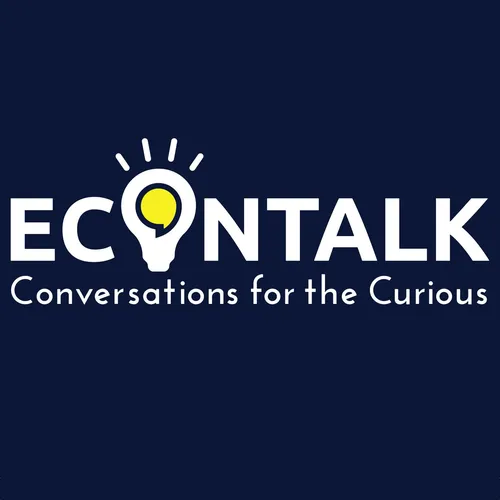
EconTalk
EconTalk: Conversations for the Curious is an award-winning weekly podcast hosted by Russ Roberts of Shalem College in Jerusalem and Stanford's Hoover Institution. The eclectic guest list includes authors, doctors, psychologists, historians, philosophers, economists, and more. Learn how the health care system really works, the serenity that comes from humility, the challenge of interpreting data, how potato chips are made, what it's like to run an upscale Manhattan restaurant, what caused the 2008 financial crisis, the nature of consciousness, and more. EconTalk has been taking the Monday out of Mondays since 2006. All 900+ episodes are available in the archive. Go to EconTalk.org for transcripts, related resources, and comments.
- Update frequency
- every 7 days
- Average duration
- 68 minutes
- Episodes
- 1014
- Years Active
- 2006 - 2025

Casey Mulligan on Vaccines, the Pandemic, and the FDA
When there's no vaccine on the market, people will look for other ways to be safe, including school closures and the handwashing of groceries. Listen as economist Casey Mulligan of the University Chi…

Tyler Cowen on the Risks and Impact of Artificial Intelligence
Economist Tyler Cowen of George Mason University talks with EconTalk's Russ Roberts about the benefits and dangers of artificial intelligence. Cowen argues that the worriers--those who think that art…

Eliezer Yudkowsky on the Dangers of AI
Eliezer Yudkowsky insists that once artificial intelligence becomes smarter than people, everyone on earth will die. Listen as Yudkowsky speaks with EconTalk's Russ Roberts on why we should be very, …

Patrick House and Itzhak Fried on the Brain's Mysteries
While operating on a 16-year-old girl who suffered from severe seizures, neurosurgeon Itzhak Fried stumbled on the region of the brain that makes us laugh. To neuroscientist Patrick House, Fried's ab…

Michael Munger on the Perfect vs. the Good
Is the perfect really the enemy of the good? Or is it the other way around? In 2008, Duke University economist Michael Munger ran for governor and proposed increasing school choice through vouchers f…

Dana Gioia on Poetry, Death and Mortality
When he was a child, poet Dana Gioia's mother would come home from a long day of work and recite poems while she cleaned. It was a way, he realized later, for her to express the feelings she didn't w…

Daniel Gordis on Israel and Impossible Takes Longer
As Israel turns 75, has it fulfilled the promise of its founders? Daniel Gordis of Shalem College talks about his book, Impossible Takes Longer, with EconTalk's Russ Roberts looking at the successes …

Erik Hoel on the Threat to Humanity from AI
They operate according to rules we can never fully understand. They can be unreliable, uncontrollable, and misaligned with human values. They're fast becoming as intelligent as humans--and they're ex…

Kevin Kelly on Advice, AI, and Technology
Photographer, author, and visionary Kevin Kelly talks about his book Excellent Advice for Living with EconTalk's Russ Roberts. His advice includes how to have a deep conversation, why it's better to …

Megan McArdle on the Oedipus Trap
When physician Walter Freeman died in 1972, he still believed that lobotomies were the best treatment for mental illness. A pioneer in the method, he was a deeply confident and charismatic man who ea…

Zach Weinersmith on Beowulf and Bea Wolf
Tolkien read it as a tale about mortality. The poet David Whyte said it was a metaphor for the psychological demons deep in our minds. And that, insists the cartoonist and writer Zach Weinersmith, is…

Omer Moav on the Emergence of the State
Since at least Adam Smith, the common wisdom has been that the transition from hunter-gathering to farming allowed the creation of the State. Farming, so went the theory, led to agricultural surplus,…

Paul Bloom on Psych, Psychology, and the Human Mind
Do psychologists know anything? Psychologist Paul Bloom says yes--but not the things that you might think. Bloom discusses his book Psych with EconTalk's Russ Roberts and what the field of psychology…

Marco Ramos on Misunderstanding Mental Illness
When psychiatrist Marco Ramos of Yale University prescribes antidepressants to patients in distress and they ask him how they work, Ramos admits: We don't really know. And too often, they don't work …

Adam Mastroianni on Peer Review and the Academic Kitchen
Psychologist Adam Mastroianni says peer review has failed. Papers with major errors make it through the process. The ones without errors often fail to replicate. One approach to improve the process i…

Sam Harris on Meditation, Mindfulness, and Morality
According to neuroscientist and philosopher Sam Harris, rationality is the key to safeguarding everything we cherish, and its only true enemy is dogmatic inflexibility. Harris speaks with EconTalk ho…

Vinay Prasad on Pharmaceuticals, the FDA, and the Death of Duty
Oncologist and epidemiologist Vinay Prasad argues that too many very expensive drugs get approved by the FDA that have very limited impact on the lives of patients. Prasad explains the incentives tha…

Dwayne Betts on Beauty, Prison, and Redaction
Dwayne Betts was a 16-year-old in solitary confinement when a fellow inmate slid a book of poetry under his cell door. What happened next is an astounding story of transformation: from desperation to…

Tiffany Jenkins on Plunder, Museums, and Marbles
Should the British Museum return the Elgin Marbles, taken from the Parthenon in Athens about 200 years ago? What should be the purpose of museums, education or social justice? Listen as Tiffany Jenki…

Ian Leslie on Being Human in the Age of AI
When OpenAI launched its conversational chatbot this past November, author Ian Leslie was struck by the humanness of the computer's dialogue. Then he realized that he had it exactly backward: In an a…